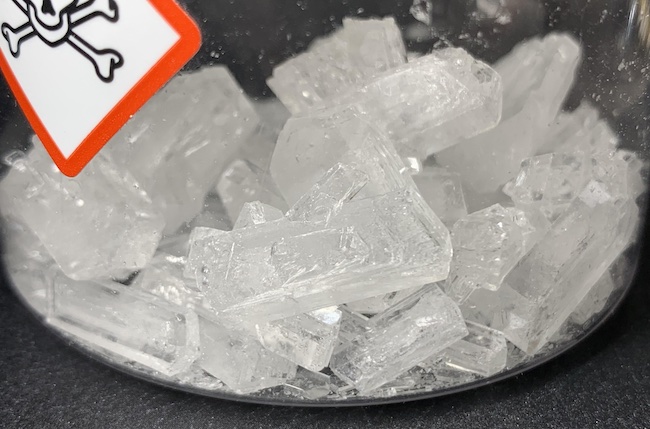Lead acetate is one of the most useful chemicals. After all, you can find it in insecticides, varnishes, and dyes. It is also an important tool for people in the printing business.
Although lead acetate performs various tasks, it is classified as a hazardous material. If handled improperly, you might harm yourself or your project.

So how do you dispose of lead acetate? Because of its toxic nature, you can’t dump it in the trash. Also, you can’t flush it down the drain or sink. However, they are better ways to dispose of this substance.
Here is the best way to remove lead acetate from your property.
How to Dispose of Lead Acetate
As lead acetate is a toxic substance, you should treat it as a hazardous material. With this in mind, you should use special precautions to handle this material or its products.
Research the laws concerning hazardous waste disposal: In some areas, some laws control the dumping of hazardous materials. When these laws are broken, you might be fined or jailed. With this in mind, ensure you know the rules before getting rid of the lead acetate.
Check the label: On most lead acetate products, you will find directions for dumping them. To get these instructions, check the packaging of the product itself.
Contact the waste management company: Ring up the waste management company and check if they dispose of lead acetate or its products. If they do, there’s a high chance that you might pay an extra fee for this service. Also, ask for any extra advice with handling the lead acetate.
Ask for a mail-in recycling kit: If your waste management company cannot reach your location, ask them for mail-in recycling kits. Mail-in recycles kits consist of special trash cans for lead acetate and other hazardous materials. If the company sends these items, they will also send details on how to use and return them.
How to Dispose of Paint Containing Lead Acetate
Lead acetate stands as a regular ingredient in making paints. With this in mind, it might not be a good idea to empty the paint into the sewer or yard. However, you can drop off the cans at a paint recycling event.
In many locations, such programs help to deal with unwanted cans of paint. Besides, they make it easy for people to submit these items.
To drop paint at a paint recycling event: –
- Search for the drop-off site that is close to your location.
- Call ahead to get any additional information.
- Visit the center and hand over the paint.
- If you have more than 100 gallons of paint: –
- Look for a drop-off site at your location
- Call them and request pickup service.
How to Dispose of Lead Acetate Spills
If you have a lead acetate spill in your home or workplace, you will have to contact experienced personnel to handle this issue. After all, people with less experience might get hurt as they try to clean the spill.
To deal with the lead acetate spills, the expert should
- Wear protective clothing and eyewear
- Ensure the area does not contain people.
- Turn off items that can ignite fires.
- Dampen the spilled lead acetate powder
- Collecting the spilled lead acetate with a HEPA – filter vacuum.
- Place the lead acetate in special containers
- Allow air into the room
- Contact the Environmental Protection Agency in your area for extra help. Most times, these agencies offer additional advice on how to get rid of the lead acetate.
The Effects of Exposing Yourself to Lead Acetate
If you handle lead acetate without any precautions, you can have health issues. These problems are divided into short-term effects and long-term effects.
Short Term Effects: These are the effects of lead acetate on your body, especially if you were exposed to the substance for a short period. Short-term effects include headaches, mood swings, poor sleep, stomach upsets, and fatigue. Besides the substance can hurt your eyes.
Long Term Effects: If you were exposed to lead acetate for long periods, you might come down with any of several types of deadly cancers.
What Should I Do If I Am Exposed to Lead Acetate?
Accidents can happen with lead acetate. When such issues happen, you should be ready to minimize the effects of such exposure. After using each of these ideas these problems, remember to visit the hospital.
Contact to Eyes: Ensure that lead acetate does not meet your eyes. If it does, immediately flush the eyes with lots of cool water for 15 minutes. Also, try to rinse inside your eyelids and remove contact lenses.
Inhalation: Lead acetate is a very dangerous substance. If a person inhales this substance, ensure that they visit the hospital immediately.
Skin: Lead acetate can also get on exposed skin. You can handle this problem by washing off the substance and removing any contaminated clothing. Also, seek medical assistance from the experts.
Extra Tips for Disposing of Lead Acetate
If you want to get rid of pure lead acetate :
- Do not dump it in the trash
- Do not dump it in the sewer
- Contact professionals to remove the substance from your property
Wrapping Up
Lead acetate is seen as an important substance. But if you dispose of this material, you cannot dump it like your regular trash.
Contact the company that handles your trash. Then ask if they offer disposal services for hazardous materials such as lead acetate.
For spills, experienced personnel should wear the right clothing and ensure that the area is empty. If it’s in powder form, clean it up with the right vacuum cleaner. Also, seek extra advice from your waste management supplier.


